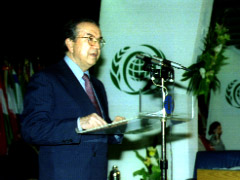


UNITED NATIONS UNIVERSITY (UNU) - UNIVERSITE DES NATIONS UNIES - UNIVERSIDAD DE LAS NACIONES UNIDAS | ||
Mr. Heitor Gurgulino de Souza, Rector, United Nations University (UNU) | ||

The United Nations University (UNU) has been deeply engaged in the fight against hunger since its earliest days, some 20 years ago. Our basic focus has been on strengthening the capacity of institutions in developing countries to provide the needed research, advanced training and advisory services in food and nutrition. World hunger was chosen as one of the initial three priority programmes of the University by the first UNU Governing Council in 1975. The United Nations University has supported extensive research to determine human protein requirements under conditions prevailing in developing countries that led to an increase of one-third in estimated adult needs for protein at the 1985 FAO/WHO/UNU Consultation. It also supported developing country research on the energy requirements of children, an important area in which information was lacking. The United Nations University's Food and Nutrition Programme works closely with FAO in the area of food composition data; with WHO in studies for the prevention of iron deficiency anaemia, with both WHO and FAO in research and analysis of issues relating to dietary protein and energy requirements and the consequences of the deficiencies through the International Dietary Energy Consultative Group; and also worked with UNICEF in the development and application of Rapid Assessment Procedures, and with the IAEA in the application of isotope methodologies to determine the nutritional impact of infections. The United Nations University's food and nutrition efforts are also well integrated within the United Nations system through the United Nations' Administrative Coordinating Committee's Sub-Committee on Nutrition, the ACC/SCN. I would now like to give a very brief overview of some of the major global activities and related publication efforts of the UNU. In 1983, we sponsored the establishment of the International Food Data Systems, the INFOODS project, that has as its goal improving the quality and availability of data on the nutritional composition of foods, particularly within developing countries. The Food and Agriculture Organization and UNU are now jointly extending the Global Food Composition Database Network to include all of the world's countries as well as supporting institution-building and training in this field. The United Nations University, with UNICEF's support, has pioneered the application of relatively rapid qualitative anthropological methodologies to the design, evaluation and improvement of nutrition and health interventions. This methodology, known as RAP for "Rapid Assessment Procedures" is now widely used throughout the United Nations system as well as by bilateral agencies, NGOs and national groups. Iron deficiency is the most prevalent and neglected nutritional deficiency in the world today, and its alleviation has been a long-term concern of our university. Initial research results, suggesting that weekly iron supplementation, as opposed to daily, could be effective have now been encouraging and we wish to continue to work on the prevention of iron deficiency in cooperation with WHO and UNICEF. In addition to research, UNU's Food and Nutrition Programme provides fellowships for various kinds of advanced training. We deem our UNU Fellows to be one of our true success stories, a direct response to our Charter mandate to build institutional capacities in the developing world. Since this effort was launched we have awarded over 600 fellowships in the field of food and nutrition. But more than the numbers, however, it is the widening ripple impact of these fellows, many of whom have returned from UNU studies to their home countries and occupy important policy-making and higher education positions. Some are in United Nations agencies and I am very glad to say that some are here in this Summit in Rome. Pertinent information in the nutrition and health-related fields is disseminated by UNU through two quarterly journals, the Food and Nutrition Bulletin and the Journal of Food Composition and Analysis. In conclusion, while time does not permit a more extensive description of the work of UNU in the area of food and nutrition, a brochure is available, to all delegations, describing it in more detail. Most of the past work of UNU was coordinated, in a network of centres throughout the world, by Professor Nevin Scrimshaw from the Massachusetts Institute of Technology and also by Professor Cutberto Garza from Cornell University, who is present here at this Summit. The United Nations University has also carried out a series of activities related to hunger and poverty through its World Institute for Development Economics Research in Helsinki, Finland. This work was coordinated by Professor Amartya Sen of Harvard University and drew out some of the far-reaching interconnections between economic policies and political factors in such path-breaking works as Hunger and Public Action and The Political Economy of Hunger. I would also like to mention one new initiative in a related area which UNU will launch with the Government of Iceland. Beginning in 1998, we will initiate a Fisheries Training Programme for researchers from developing countries in the sustainable exploitation of fishery resources. In conclusion, I wish to reaffirm that UNU is committed to the development of the human capital necessary to generate and implement solutions to these challenges and pledges to cooperate with its affiliated global network of universities and the wider global community of scholars represented by the International Union of Nutrition Scientists to sustain this commitment. The United Nations University also reaffirms its commitment to stimulate research in the area of food and nutrition and action programmes for the implementation of accumulated knowledge. We are committed to the development of a consortium of sponsors interested in stimulating university-based research in areas of direct interest to the recommendations and Plan of Action formulated at this Summit. Again, we welcome each of you to this effort in full partnership with us and the international community of scholars. | ||
|
|
|
|

 |